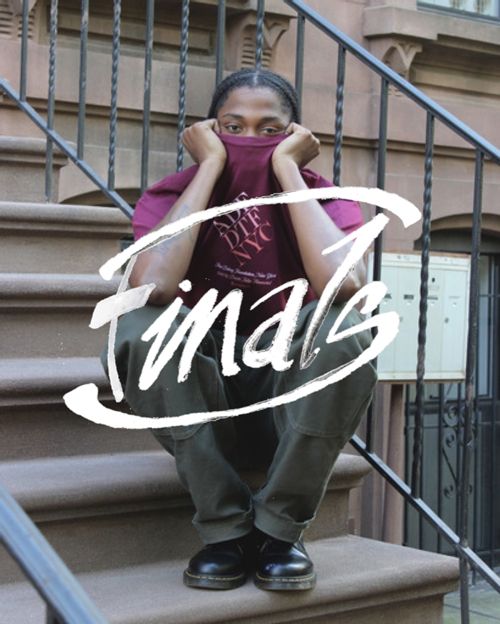
Named after the first recorded speculative bubble, Dutch Tulip Financial is a NYC-based streetwear brand that's been on my mind heavy since I got hip a little while back through the Antithesis store in Manhattan. Unlike most fashion which is about advancing the status quo and joining a herd, DTF requires your brain to work for the brand to click, and is about criticizing "the way things are."
Founder/designer Moonwhan Park's graphics generally reference exploitation by dominant culture, governments, unduly powerful conglomerates and oligarchies. The results are funny and trenchant, playing into consumer culture in a way that is also about calling out and laughing at the absurdity of living in a rich man's world. Streetwear as artistic commentary.
To dig into DTF further I hopped on Zoom for a cool hour and 15 minutes with Mr. Park, the one-man show behind the whole shebang (design, photography, sales, everything). We talked about Korean politics, his famous antiestablishment poet grandpa, the best place to eat intestines in NYC, and Oldboy, among other topics.
All images by Moonwhan Park
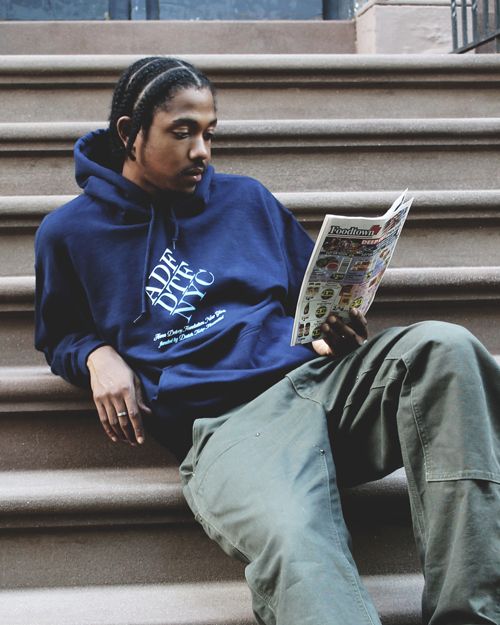
You just dropped your Anna Delvey capsule. What do you like about her?
She’s a scammer, so I don’t want to put her on a pedestal necessarily. But what she represents and exploited very well was the worshipping of wealth. Not just what she did with her fake heiress background, but wherever you go, people worship wealth and we give wealthy people power. And why? Why is Elon Musk so powerful, just because he’s rich? It’s the same in Korea. Korea has jaebol (a handful of companies that run the country like an oligarchy), and there’s some sort of irrational reverence for them. “There he goes, he’s jaebol, he’s Lee family, Chung family…” But I always had this doubt.
When I grew up in Korea, I went to this elementary school that was private and had a lot of kids from those jaebol families, or extended jaebol families. And since we were young, nobody had self-awareness or an identity of “I’m rich, fuck you.” We just mingled normally. But as I grew up I saw how my other friends revered those kids, and acted differently when I was with them compared to by myself. I thought it was so weird cuz I knew those guys when we were eight years old. Nowadays, I only keep up with a few of those rich-rich guys, but seeing the weird class structure, how they carried themselves as they got older, how people treated them, I thought it was weird. In my mind they’re not better or worse than us. But they have an aura of coming from an important family. Anna Delvey created that same kind of persona by faking that she was from a European aristocratic family. So I thought it was funny, and I thought it was a reflection of modern society that she was able to succeed as much as she did.
DTF graphics reference economics, social control, exploitation –– what draws you to these themes? You talked about growing up in the shadow of jaebol but what else got you interested in these topics?
Two things. One of the friends I’m still friends with, and is a great guy, and of course is in private equity now — he used to live here and still comes to New York frequently on business trips. In 2018/2019 he came here and hit me up, and brought me to some random Upper East Side intersection. And he was pretty stoked about what he just experienced. He was telling me about this social club, and how he was either the first or second Korean guy to get into it. Five interviews, 12 reference letters. Just to be in this exclusive thing. Super secretive. I don’t even know if it had a name. It was for, I guess, white guys. Mainly. He was telling me that the guys in it were hedge fund billionaires, and when he got in there, he saw those guys wearing robes and playing tennis and chilling, and making behind the scenes deals. I thought that was movie stuff. But when I learned that was real, that was a direct inspiration for DTF.
I was like, OK, let me make a conceptual construct where I can inject different storylines into it. I do t-shirts because I didn’t have any money. And it also came out of my desire to differentiate what I do from streetwear as a whole. It was when Virgil Abloh was like “Streetwear is an art,” 2017/2018, and I was like, I can’t just slap my logo on a shirt and not add to the conversation. So I was trying to find my lane. And the stories I heard from my private equity friends and business school friends who worked at investment banks were inspirations for me. There are a lot of brands who do social commentary, but they don’t use finance or capitalism to tell stories. So I thought that could be my lane, with the help of the stories I hear from the guys who are in that industry.
The second big inspiration was my grandfather, a really well respected poet in Korea who passed away in the ‘90s. If you grow up in Korea you know his name: Tu-Jin Park. He has a memorial museum, he’s a big figure in the Korean art world in the 20th century. I lived with him, and he had this aura around him. Even when I was little, I was like, I should not bother him — he’s doing something great. He was the type to wake up at 5 am, meditate for an hour, do calligraphy, have a real small meal, pray for an hour, write for seven hours straight, eat another small meal, meditate, do yoga, and go to sleep. Korea now, we’re doing OK, but in the ‘60s, ‘70s, ‘80s that wasn’t the case. We were under a harsh political regime. And when he was young, we were under Japanese colonization. His whole thing was rebellious, socially. And he paid for his views. He got shot at by police, and tortured by the Korean version of the CIA. He got shot at during 4/19, a big democratic event in Korea in the early 1960s. The regime was headed by Sing-Man Lee, who was doing what Putin is doing, illegally extending his term three or four times. But my grandfather was a professor and his students went to the streets to protest, and police opened fire. And my grandfather ran out. He was pretty well known even then, and dared them to shoot him. And they still shot at him. He had the acclaim, the respect, but the life…my dad and grandmother lived in poverty. It was hardship all the time. I always knew I wouldn’t be as good as him, whatever I did. I saw him as an archetype, solitary genius figure. He didn’t get swayed by any temptations, money or anything. He was like a monk. In the ‘70s there was another military regime headed by Chung-Hee Park. And to sway my grandfather, the first lady wanted him to be her private literature tutor. And obviously my grandfather said, Fuck off. Park’s term went on for 19 years, it was like the dark ages.
So I felt like, I’ll never be able to do that. I’m going to lead a normal life, study business, and be normal — go to a respectable school, wear a suit. I tried. I tried to be a normal Korean. That was me working at Samsung, which is where I met my wife, who was Korean-American, which is how I got to New York, when I was 30. But actually I did have another small business thing at the time. I was doing it with a friend, when I came to New York. And my friend ran off with the money!
DTF came about because I literally hit rock bottom. I was broke in New York, stabbed in the back by my friend. It was a soul-searching moment, 2017/2018. I only had money for screen printing a small run. And I knew I wanted to be adjacent to art, if not be an artist myself. I always viewed myself as someone that’s not worthy of being an artist, because of my grandfather. But when I hit rock bottom, I was like eff it, I’m going to treat this as an art project. In this day and age, some people might see it as art adjacent.
So that’s a long story, but my friends and somewhat of a corporate background gave me the inspiration for DTF, and as far as my approach to things, it’s super shaped by my grandfather.
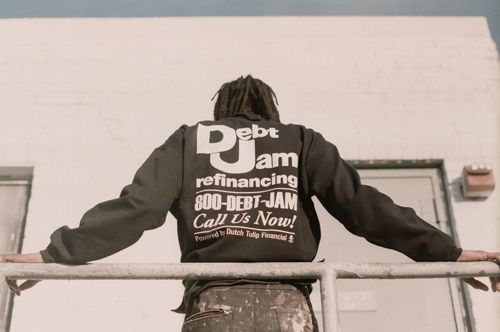
That’s fascinating. What’s your favorite poem of your grandfather’s?
It’s called “The Sun.” It’s really hard to translate. One thing that separates him from other poets who wrote about the sun, is the tone is very authoritative towards the sun. He’s ordering the sun to rise up. Like hey, sun, get the fuck out and rise up. I’m butchering it. But I heard from literature critics you don’t typically see that approach. It’s more poets singing about the beauty of the sun, in a romantic way. But at the time Korea was between the Korean War and the Japanese colonization, dark times, and metaphorically he wanted the sun to rise up and break through for the situation in Korea. Urgently. His poems really reflect his personality, very masculine, strong words, very convincing. He wasn’t like a “My life sucks guy,” it was no melancholy, just (punches his hand three times).
I’m interested in Korean history. The ‘70s in particular was such a crazy time -– the Chung-Hee Park years. Really terrible for human rights, people going to jail for having long hair, and for countercultural figures like your grandfather it was very dangerous. But it was also when Korea rebuilt itself from a colonized and war-torn country that was previously agricultural, to something resembling today where they are a modern global superpower or close to that. And there’s this rationalization that I really hate, which is that you have to break eggs to make an omelet. That you don’t get that development and advancement without treating people like garbage. You have to be bad to people to succeed in the grand scheme.
It gets short term results. (Heavy sigh) I identify as Korean. I don’t have plans to get American citizenship. And it hurts me, because for me, the two steps that epitomize the current status of Korea as far as how people feel, the the pressure they’re under, is we have the highest rate of suicide, and the lowest birth rate. That means people don’t want to live. That shows you how much stress and pressure there is.
Do you think that’s a byproduct of the 1970s culture?
Has to be. Not a direct byproduct of it, maybe, but yeah. It’s also such a compressed country, so dense, and homogenous, monoculture…so the frame of reference is too close. Everybody grows up the same, looks the same, put under a pretty limited set of predetermined life paths. You have to be this or that, or you’re done. I felt, being there, that I was always being compared to someone. New York is pretty crazy, but because we’re all so different – Asian, Black, Latinos, white people – I personally don’t have the same criteria of judging myself based on other people. Everyone is doing their own thing. The sheer diversity helps me instinctively not compare myself. But in Korea, the degrees of separation are like two or three. Everybody knows each other. And it’s not taboo to comment on people’s situations. “Hey you look like you gained weight.” Or “Hey I heard you lost your job.” All those things compounded. Just my theory. There’s a village-like culture, maybe stemming from the agricultural aspect, where everybody was in poverty, and everyone had to share meals. We’re all in this together, no boundaries type situation.
On a hopeful note, what inspires you about today’s youth?
I love Greta Thunberg and Generation Z. Millennials –– technically I’m a millennial –– we were kind of a go with the flow generation. I want Generation Z to give us shit. We deserve it. We should do better. And they know that, and I like that about Gen Z. As far as fashion, if they’re doing more Depop, more trading instead of buying, that’s good. I don’t sell that many t-shirts so I don’t have that big of a guilt environmentally, but it’s still a guilt. I looked at recycled cotton blanks and tried it, but when I make them, to make my money back I have to charge more, and people don’t buy it. So those recycled cotton ideas are only for the companies that already have a lot of money. Gildan and Hanes –– I want those guys to make more accessible recycled cotton options. I think we’ll get there, because Gen Z wants more eco-friendly options, and that’s who will be buying things going forward. As far as big changes and shift, I don’t know, I feel almost powerless but the least I could do is listen and not try to silence when Gen Z are speaking out. They’re the ones who have to deal with all our bullshit, so they have the right to give us shit. As far as making things better, I have to do my part, I’m a dad, I’m always thinking about my son.
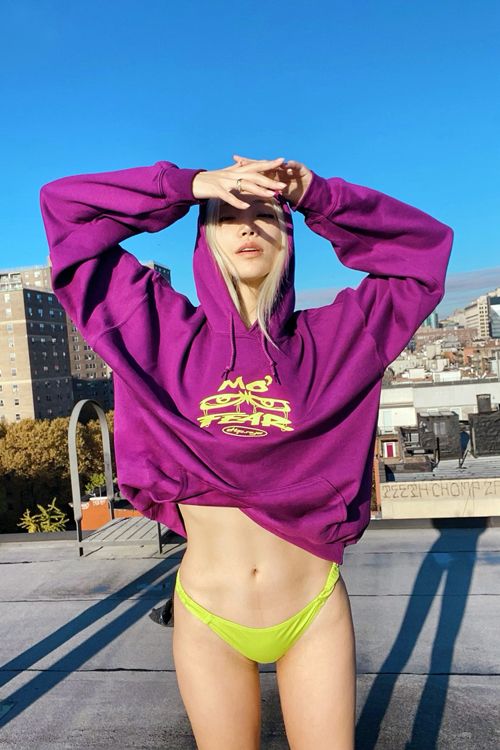
OK lightning round, eight questions real quick. Favorite Korean food in NYC?
There’s this place called Gopchang BBQ I think there’s one in Manhattan Koreatown and one in Flushing. It’s intestines. LIke Korean BBQ, but with only intestines instead. They clean it out of course. It’s not anything glamorous at all, but because of the cleaning process, in Korea it’s not cheap. But because nobody outside of Koreans care for those parts of the animal in the US, it’s cheaper here. You eat it as lettuce wraps with white rice.
Favorite brand?
To be honest I don’t have one. I respect a lot of brands, Cav Empt. I don’t own any Off-White or LV because it’s too expensive, but I really respected Virgil Abloh. The totality of what he did. Me not having any favorite brands is more to do with being a dad now. I don’t care anymore. Technically I’m in fashion, but I look at kid’s shoes more. As opposed to “There’s this new drop.” I don’t care about any of that. My son needs shoes. That’s where I’m at.
Favorite movie?
Oldboy.
I always think about the wallpaper in that movie, the honeycomb pattern that’s supposed to drive you insane.
Yeah yeah.
Favorite musician?
Tupac. I’m still that generation.
Favorite album?
Makaveli.
Favorite shoe?
Air Jordan 8, black OG. With the straps, and some crazy graphic pattern at the heel. It was the first Air Jordan that I had.
Favorite t-shirt that you own?
One that I customized at an event with my son’s name on it, B-E-N-N-Y.
Last one: favorite politician?
Probably Chun-Ha Chang. He was before my time, but he was the anti-military regime democratic fighter. He was the leader of the opposition to President Park. Of course he died due to “mysterious causes.” One of my father’s best friends is the son of that guy. His friend had to suffer, after his dad’s death. He couldn’t get regular jobs. He was this super smart guy but nobody was hiring him. He did odd jobs his whole life. And they joke about it now, because my dad’s friend is a jack of all trades because of bouncing from this job to that job. He’s like the ultimate handyman now. He accepted it as his fate, and likes it, in a way. By all accounts though his dad was a very respectable guy. If he didn’t get assassinated, maybe Koreans’ recent history could have gone a different direction. A huge what-if situation.
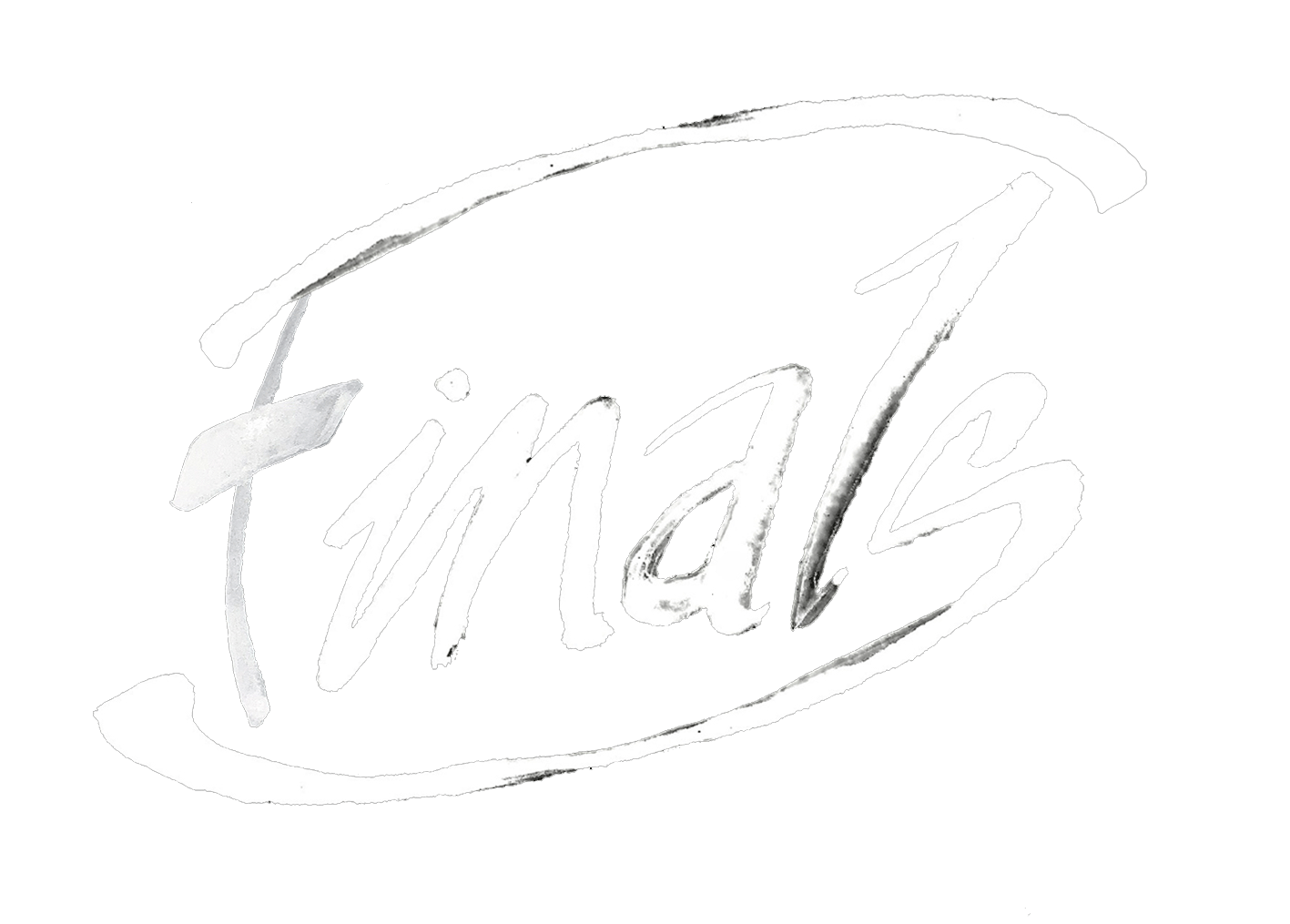
Comments
Leave a Comment